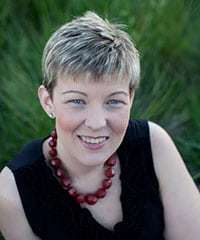MAC Region: J11 Palmetto

Tell us a little bit about who you are apart from your illness.
I grew up in a small town in eastern NC, but now call Raleigh home. My husband, Jason, and I are pup-parents to the best little Maltese-Yorkie named Davie Pierson (She’s our special girl!). I work in human resources for a contract research organization (CRO) that does large molecule bioanalysis. Every single day, I get to tell the story of our organization and how we help impact patients’ lives (including mine!).
What is your diagnosis and when were you diagnosed?
I have Ankylosing Spondylitis (AS) and Fibromyalgia. I was diagnosed with AS in ~2002, after many years of misdiagnosis. I was diagnosed with Fibromyalgia in ~2014.
Can you talk a little bit about your experience with diagnosis?
I have vivid memories of pain as early as 11 years old. There were times when I was in such excruciating pain that I would be forced to stay home from school. My mother has AS (and her father also did before his passing in 1992). After my PawPaw (maternal grandfather) passed away, my mother decided that my pain had become too frequent and something needed to be done. She tried to get doctors to start doing tests specifically related to a rheumatic disease/condition but wasn’t successful. As a young teen, unfortunately, I was at the mercy of “old school” small town doctors. I was subjected to many tests related to digestive disorders and orthopedic issues. I was often told that it was “in my head…” and it was growing pains. Generally, Ankylosing Spondylitis is not thought to occur until early adulthood, and it is believed by many medical professionals to be more common in men. AS was just not on the radar of a doctor treating a young girl.
In ~1996, I was finally diagnosed with undifferentiated spondyloarthropy. By that time, my guard was up, and I was a busy teen. I was no longer trusting of many medical professionals due to the tests I had endured, and lack of treatment received. I had developed my coping mechanisms; I wanted nothing more than to ignore the pain and proceed forward with no help from anyone (I’m a bit stubborn, obviously). I managed to trudge along well through high school and part of college. It was during college that I was finally referred to a rheumatologist at UNC-Chapel Hill. Finally, at age 22, I was officially diagnosed with AS. However, my insurance company would not approve newer treatments (Enbrel, Remicade) as they came to the market. Since then, I’ve had ups and downs with treatment and doctors but it’s always a learning experience.
What is your greatest challenge in living with a rheumatic disease?
I believe there are two main challenges associated with living with AS – 1) living with a very painful, often causing near-debilitating, condition for which there is no cure that no one can see and rarely understands and 2) the sheer mental frustration caused by this condition. I have learned a lot over the 25+ years I have been managing the symptoms of AS. I know I can make it through anything so long as I don’t let it (the pain, fatigue, mental frustrations, etc.) lead me “down the rabbit hole”. If I can keep my mind right, I’m good. I can pretty much fight any thing that comes my way, so long as my frame of mind is in gear.
Describe something that keeps you hopeful in the day-to-day struggles with your illness.
The one thing that keeps me hopeful is knowing that one day there will be a way for others to not have to hurt, fight with medical providers and insurance, etc. There may not be a cure in my lifetime, but advances are being made daily with regard to medications, communication, patient interaction, etc. All of that will lead to someone else suffering less.
Why is advocacy important to you?
Every single person has a story and every story is important. Each individual patient perspective and experience is an opportunity to help another patient feel more empowered. Each story is a lesson to a rheumatology resident about bedside manner. Each time we tell about our journey, it paints a picture for a lawmaker. Every opportunity to tell about your story is an opportunity to education someone. All those pieces together are a part of an amazing puzzle that needs all the pieces to create the beautiful community we are creating through Creaky Joints |Patient Council.





